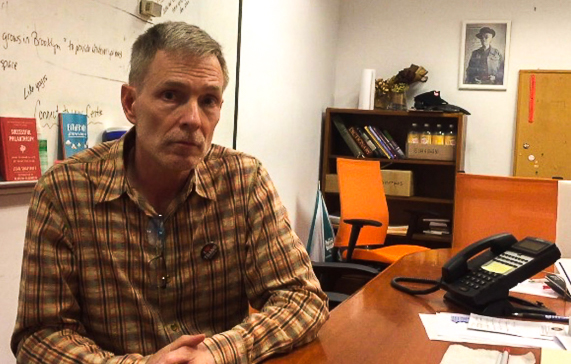When Jeff Goad, a 36-year-old gay man who voted for Hillary Clinton, found out that his brother, Joseph, had voted for Donald Trump, he felt there was a wall between him and his family, as he put in a first interview. Then, a few days later, he had a long conversation with his brother on the phone and, in a second interview, described those moments as “lovely.”
Although Trump has not said anything specifically anti-LGBT, members of his party have not favored gay rights, and the fear that vice President-elect Mike Pence believed in gay conversion therapy, as some LGBT groups claim, terrified him, Goad said. (Journalistic reports say Pence’s belief in conversion therapy is not clear, but he has opposed laws prohibiting discrimination against LGBT people and rejected Obama’s administration directive on transgender bathrooms when he was a member of the House of Representatives.) “I have to edit myself around the family. That hurts. People you care about don’t hear your concerns,” Goad said during that first interview.
“But I unintentionally misrepresented some of my brother’s actual views,” Goad said during the follow-up conversation. “He is not as pro-Trump as I thought, and I am glad that I can have a conversation about politics with my family now.”
Three days after Election Day, the Brooklyn Community Pride Center in Downtown Brooklyn held a discussion panel for LGBT people to talk about any concerns they had—the majority of which turned out to be concerns about two things: their rights under the new administration, and getting along with some anti-LGBT and pro-Trump family members.
But a month later, some panel participants and staff at the pride center, including Goad, say they have been reconciling with their families to some extent, even as some of those families remain anti-LGBT or pro-Trump or both. The members of the Pride Center have also been seeking support and solidarity within their LGBT communities, they say, and preparing to stand up for their rights.
Although Goad’s brother Joseph accepted the fact that Goad was gay a few years ago, the two brothers did not talk about politics, because their different views could too easily bring them into arguments, Goad said during the first interview. “I felt weird because we were hanging out, chatting, laughing and drinking wine a week before the election.”
After the election, the two brothers talked on the phone again and had an opportunity to clarify some misunderstandings, Goad said. “Actually, my brother thinks both candidates are awful, but he hates Hillary more,” Goad said. “When he called me, he was on a mountain in Montana by himself and hunting with his rifle. He thinks Hillary would abolish the Second Amendment.”
The conversation was peaceful, as they promised each other to stop and move on to a new topic if their discussion on the political issues became too heated, Goad said. He was relieved that Joseph did not support Trump as much as he thought. Still, his concern about the rights and safety of the LGBT groups remains. “It still makes me sad that my brother is willing to put his political views about gun control ahead of my basic civil rights,” he said.
Goad’s concerns do not come from nowhere. Hate crimes in New York City based on sexual orientation made up the second-highest number of such crimes—78 in 2014 and 81 in 2015—right behind religion-based crime cases, according to the FBI crime data. As of mid December, the Police Department’s Hate Crime Task Force had received 43 cases deemed possible hate crimes based on religion, sexual orientation, and race in the city since the Election Day, twice the number in the same time period last year, as reported by The New York Times.
Daniel Cyan, 19, a trans man and former intern at the pride center, said hatred and rejection could come from his own family. He comes from Guatemala and described his family as “conservative.” “They kept telling me that I should dress like a girl because that’s what they want for me,” Cyan said.
Cyan’s father, whom he described as simply “Republican,” voted for Trump in the election. They went through days without talking afterwards, Cyan said. “After the election, I don’t really want to be home. When I’m at home, I avoid talking to them.”
But after going through family therapy post-election—during which his family’s counselor pointed out that judgment from his parents would have negative psychological effect on him—they started talking again, Cyan said.

Some members of LGBT groups whose parents have died say that finding bonds and unity within their own community has given them consolation and courage. Floyd Rumohr, 53, executive director at the pride center, said he rarely went back to his hometown in Michigan after his parents died. In Rumohr’s opinion, the town was a racist and homophobic place when he was there. “It was better to have been a dead gay guy than an alive gay guy,” Rumohr said. “I’ve been called a fag since I was 12, including my own brother. The bigotry was nothing new. What is new is that racism, sexism, and homophobia has been elected to the highest office.”
Rumohr said none of his family in Michigan reached out to him when the Supreme Court made gay marriage legal in all states. “I won’t see them again. Seeing someone is by choice. A funeral is probably the only reason I will see them. I’m tired of being tolerated by them,” Rumohr said. “The people who love and support on a daily basis are here. They may not be blood-related, but they are my family.”
The center has continued organizing discussion panels to provide LGBT people with a safe place to share their concerns and find solidarity within each other, Rumohr said. “First, we heal. Then, we rise,” he said. “We will eventually take a step forward and another step forward, another and another.”


Leave a Reply